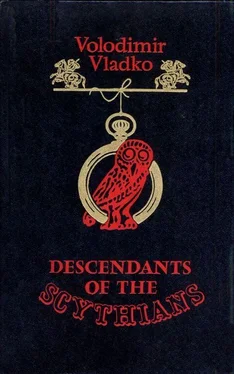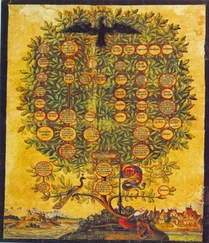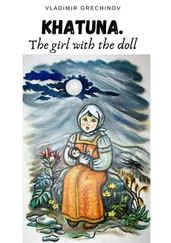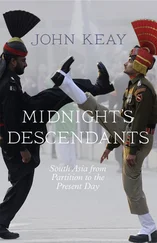Ronis fell silent, and the others were silent, too, their heads bent low in thought. They were sitting by the fire in the glade. Varkan went on working quietly at the arrow shafts with his knife as though the story did not concern him at all. But he glanced at them occasionally to see whether they were listening attentively enough then bent low over the arrow he was working at.
Dmitro Borisovich was all ears but didn’t forget to translate Ronis’s story for Artem, who was no less excited to hear it. This ancient world had been opening up before the archeologist in greater detail than could possibly be glimpsed in even the most meticulous accounts of the ancient historians or from any amount of artifacts unearthed in archeological excavations. Everything Dmitro Borisovich had observed threw additional light on the life of a Scythian tribe.
The representations of the Scythians that Dmitro Borisovich had seen earlier on the ancient jugs, vases, basreliefs, and jewelry, had now come to life before his very eyes. Could anything else give greater pleasure to an enthusiastic archeologist who had devoted his entire life to the history of the ancient tribes that had roamed the vast territories to the north of the Black Sea?
Artem was also excited to hear all this, but he was occupied with other problems.
The fate of his friends put everything else into the background. They were in the hands of Dorbatay and Hartak — or rather it was Dorbatay alone who was to be reckoned with, because Hartak could be easily dismissed as a nonentity. But on the other hand, Hartak wanted to marry Lida, and Dorbatay would be only too glad to oblige. This thought made Artem clench his fists. Though he loathed the very thought, he could not just ignore it. There was one thing that eased his mind somewhat: if Hartak intended to marry Lida, Dorbatay would not do her any harm, at least for the time being. As far as Ivan Semenovich was concerned, his only hope was Dorbatay’s fear of retribution from Artem and Dmitro Borisovich, should he come to any harm. That is, of course, if Ronis’s words were to be trusted. There was nothing else to hope for at the moment, and Artem knew it.
But there was something else that should be taken into consideration: according to Ronis, the Scythian community was about to explode in civil strife; Artem shared the views of Ronis and Varkan, and regarded the deep discontent of many Scythians as justified. It was only natural that the honest and courageous Varkan was the leader of the downtrodden hunters and herdsmen. Artem felt even more respect for his blood brother after learning of VarkanV role in the forthcoming revolt. It was also good to know that Ronis, a determined and resolute person, was the leader of the slaves who were preparing an uprising. That he was a man of exceptionally strong will could be easily seen from the story of the tortures he had been subjected to by Dorbatay. Ronis was definitely a man of mettle! He would be able to withstand any trials and carry into life all of his plans!
Thus the ways of the strangers and the leaders of the forthcoming uprising unexpectedly converged. Varkan was right in saying that all available forces should be united in the uprising. But could Artem and Dmitro Borisovich contribute anything? Weren’t they just two men seeking to free their friends? Artem thought he and Dmitro Borisovich should do all they could to help the uprising. It was a just cause, and they could not ignore it. They would join them against the priests and the nobles in their attempt to bring about justice. And if it coincided with the attempt to rescue Lida and Ivan Semenovich, so much the better!
* * $
In the long silence that ensued the only distinct sounds were the rustling of leaves and the crackling of the fire. Diana was lying beside Artem, her head resting on her outstretched forelegs; from time to time she would prick up her ears, listening to some indistinct, muffled sounds coming from the depths of the forest. The tethered horses were standing nearby; several Scythians were resting beside the horses: they were obediently fulfilling the orders of Varkan.
Ronis looked up abruptly.
“What will you tell me, strangers?” he asked Dmitro Borisovich. “I’ve told you everything there was to tell, and now Varkan and I want to hear whose side you’ll be on? Which way will you choose?”
The archeologist looked at him in surprise:
“What do you mean ‘which way?”’ he asked.
“Will you join us? Or do you prefer to remain neutral? We all understand you have that right, of course.”
“My dear Ronis,” Dmitro Borisovich said softly but firmly. “There’s nothing to discuss here, really. There is only one thing we can do, and that is to side with you against the priests and the nobles. Are you of the same opinion, Artem?” he turned to the young man.
Artem did not say anything but warmly squeezed the hands of Varkan and Ronis in an eloquent gesture that showed without words Artem’s preference. Varkan did not lower his eyes for the first time since the conversation had begun: he had been avoiding the eyes of the strangers, evidently not quite sure they would join his cause. Now Varkan looked Artem straight in the eye, and there was as much love and respect in his eyes as there was in the eyes of Artem who met his gaze. Artem realized that there had been some doubts in Varkan’s mind as to what their decision would be even though Varkan believed in the bottom of his heart that they would support him. Now everything was decided, and it was a great thing to be looking each other in the eye.
Artem broke into a broad grin.
“Dmitro Borisovich, tell Varkan,” he said, “that the problem of our participation must be considered settled. There’s nothing else to discuss! My dear blood brother should not have had any doubts concerning us… Wait, Dmitro Borisovich, wait, don’t translate all I said! Everything’s clear anyway!”
The archeologist nodded his head as if to say: yes, everything’s clear .
“But I’ve got a question of a different nature to ask,” Artem said. “According to Ronis, Varkan has quite a lot of supporters. Is that correct?”
“Yes, that’s correct,” Varkan confirmed.
“If that is so, why couldn’t these supporters help Lida and Ivan Semenovich escape as Varkan helped us? United, we could be of greater use. Besides, our friends would be safe.”
Varkan looked at Ronis searchingly after he heard the translation, but the Greek shook his head.
“No, it can’t be done now. It’s out of the question at the moment,” he said firmly. “Does our friend really think that we would not like to do it? Of course we would, but the time for it has not yet come.”
“Why?”
“You see, the priests are keeping such a close watch over the kibitka where your friends are kept that no one can even come in sight of it. Mind you, Dorbatay is sure we will make an attempt to free them, and he is prepared to repulse us. If we try it now, we will be walking into a trap.”
Artem listened to the translation in gloomy silence. Ronis was surely right, and his assessment of the situation was flawless.
“We’ll be able to free your friends later during the general uprising,” Ronis said, “or maybe shortly before it breaks out, when the priests’ attention is directed elsewhere.”
“All right, I understand,” Artem said impatiently, for his impetuosity could not be checked even with the most convincing arguments. “But when will the uprising begin? Varkan and Ronis said they’d been planning it for a long time. Why do they keep putting it off? Now, after the poisoning of Skolot, isn’t it a suitable moment to come forward and open the Scythians’ eyes to the pernicious role of Dorbatay and the treachery of the nobles?”
Читать дальше












